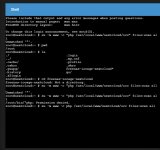Good morning, I am in the process of finishing up the scripted installation and I am running into a few problems.
[CODE}
Reinstall detected, skipping generation of new config and database
Exception: Not installed in /usr/local/www/nextcloud/lib/base.php:277
Stack trace:
#0 /usr/local/www/nextcloud/lib/base.php(656): OC::checkInstalled(Object(OC\SystemConfig))
#1 /usr/local/www/nextcloud/lib/base.php(1096): OC::init()
#2 /usr/local/www/nextcloud/cron.php(43): require_once('/usr/local/www/...')
#3 {main}
Command: su -m www -c php -f /usr/local/www/nextcloud/cron.php failed!
crontab: /mnt/includes/www-crontab: Permission denied
Command: crontab /mnt/includes/www-crontab failed!
Successfully removed mount from nextcloud's fstab
Installation complete!
Using your web browser, go to https://<registered domain> to log in
You did a reinstall, please use your old database and account credentials [/CODE]
When I navigate to my registered domain I am getting a NS_ERROR_CONNECTION_REFUSED within my network tab of DevTools, when I navigate to my jail IP address I receive a Error code: SSL_ERROR_INTERNAL_ERROR_ALERT. I have added my jail IP and my registered domain name to my local machine's /etc/hosts file. The caddy log also displays the following error.
Code:
{"level":"error","ts":1684810174.3167813,"logger":"tls.obtain","msg":"will retry","error":"[cjcloud.us] Obtain: [cjcloud.us] solving challenges: presenting for challenge: add
ing temporary record for zone \"cjcloud.us.\": got error status: HTTP 400: [{Code:6003 Message:Invalid request headers}] (order=https://acme.zerossl.com/v2/DV90/order/cBNnwX5
hbjOxMRoiBDLdRw) (ca=https://acme.zerossl.com/v2/DV90)","attempt":4,"retrying_in":300,"elapsed":313.412877649,"max_duration":2592000}
{"level":"info","ts":1684810438.6551237,"msg":"[ERROR] Keeping lock file fresh: unexpected end of JSON input - terminating lock maintenance (lockfile: /var/db/caddy/data/cadd
y/locks/issue_cert_cjcloud.us.lock)"}
{"level":"info","ts":1684810474.3278074,"logger":"tls.obtain","msg":"obtaining certificate","identifier":"cjcloud.us"}
{"level":"info","ts":1684810474.4833858,"logger":"http.acme_client","msg":"trying to solve challenge","identifier":"cjcloud.us","challenge_type":"dns-01","ca":"https://acme-s
taging-v02.api.letsencrypt.org/directory"}
{"level":"error","ts":1684810474.61267,"logger":"http.acme_client","msg":"cleaning up solver","identifier":"cjcloud.us","challenge_type":"dns-01","error":"no memory of presen
ting a DNS record for \"_acme-challenge.cjcloud.us\" (usually OK if presenting also failed)"}
{"level":"error","ts":1684810474.6447444,"logger":"tls.obtain","msg":"could not get certificate from issuer","identifier":"cjcloud.us","issuer":"acme-v02.api.letsencrypt.org-
directory","error":"[cjcloud.us] solving challenges: presenting for challenge: adding temporary record for zone \"cjcloud.us.\": got error status: HTTP 400: [{Code:6003 Messa
ge:Invalid request headers}] (order=https://acme-staging-v02.api.letsencrypt.org/acme/order/103285914/8880944484) (ca=https://acme-staging-v02.api.letsencrypt.org/directory)"
}
{"level":"info","ts":1684810476.4144492,"logger":"http.acme_client","msg":"trying to solve challenge","identifier":"<registered.domain>","challenge_type":"dns-01","ca":"https://acme.z
erossl.com/v2/DV90"}
{"level":"error","ts":1684810476.5029292,"logger":"http.acme_client","msg":"cleaning up solver","identifier":"<registered.domain>","challenge_type":"dns-01","error":"no memory of pres
enting a DNS record for \"_acme-challenge.<registered.domain>.us\" (usually OK if presenting also failed)"}
{"level":"error","ts":1684810476.9713395,"logger":"tls.obtain","msg":"could not get certificate from issuer","identifier":"cjcloud.us","issuer":"acme.zerossl.com-v2-DV90","er
ror":"[c<registered.domain>] solving challenges: presenting for challenge: adding temporary record for zone \"<registered.domain>.\": got error status: HTTP 400: [{Code:6003 Message:Invalid req
uest headers}] (order=https://acme.zerossl.com/v2/DV90/order/vrVk152XGIds5PS1FUfg6A) (ca=https://acme.zerossl.com/v2/DV90)"}
{"level":"error","ts":1684810476.9715223,"logger":"tls.obtain","msg":"will retry","error":"[<registered.domain>] Obtain: [<registered.domain>] solving challenges: presenting for challenge: add
ing temporary record for zone \"<registered.domain>\": got error status: HTTP 400: [{Code:6003 Message:Invalid request headers}] (order=https://acme.zerossl.com/v2/DV90/order/vrVk152
XGIds5PS1FUfg6A) (ca=https://acme.zerossl.com/v2/DV90)","attempt":5,"retrying_in":600,"elapsed":616.067618908,"max_duration":2592000}
My router is running DDWRT and I think dnsmasq is the area in which one can assign a domain name to my jail IP but I am unsure. I do not suspect that these issues are related. But what can be done to resolve them?


